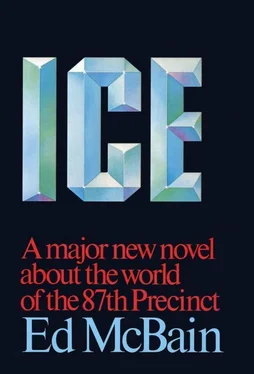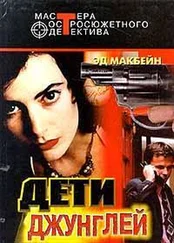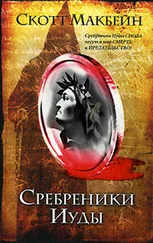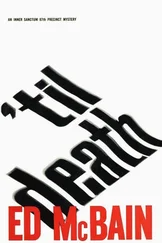“Departmental Directory,” a woman’s voice said.
“Home number for a police officer,” Kling said.
“Is this a police officer calling?”
“It is,” Kling said.
“Your name, please?”
“Bertram A. Kling.”
“Your rank and shield number, please?”
“Detective/third, 74579.”
“And the party?”
“Eileen Burke.”
There was a silence on the line.
“Is this a joke?” the woman said.
“A joke? What do you mean?”
“She called here ten minutes ago, wanting your number.”
“We’re working a case together,” Kling said, and wondered why he’d lied.
“So did she call you?”
“She called me.”
“So why didn’t you ask her what her number was?”
“I forgot,” Kling said.
“This isn’t a dating service,” the woman said.
“I told you, we’re working a case together,” Kling said.
“Sure,” the woman said. “Hold on, let me run this through.”
He waited. He knew she was making a computer check on him, verifying that he was a bona fide cop. He looked through the window. It was snowing more heavily now. Come on, he thought.
“Hello?” the woman said.
“I’m still here,” Kling said.
“Our computers are down, I had to do it manually.”
“Am I a real cop?” Kling said.
“Who knows nowadays?” the woman answered. “Here’s the number, have you got a pencil?”
He wrote down the number, thanked her for her time, and then pressed one of the receiver rest buttons on top of the phone. He released the button, got a dial tone, was about to dial, and then hesitated. What am I starting here? he wondered. I don’t want to start anything here. I’m not ready to start anything. He put the phone back on the cradle.
The contents of the safety deposit box were very interesting indeed. The way Brown was finally coming to understand it, Edelman’s precious-gems business was a mere avocation when compared to what appeared to be his true business — the accumulation of real estate in various foreign countries. The deeds to land, houses, and office buildings in such diverse countries as Italy, France, Spain, Portugal, and England were dated from as far back as five years ago to as recently as six months ago. In July of last year alone, Edelman had purchased 40,000 square meters of land in a place called Porto Santo Stefano, for 200 million Italian lire. Brown did not know where Porto Santo Stefano was. Neither did he know how much the Italian lira had been worth six months ago. But a look at the financial pages of the city’s morning paper told him that the current exchange rate was 100 lire for 12¢ US. Brown had no idea how much the exchange rate had fluctuated during the past six months. But basing the purchase price on today’s money market, Edelman would have spent something like $240,000 for the land he’d bought.
All well and good, Brown thought. A man wants to buy himself a big olive grove in Italy, fine, there was no law against that. But where was the canceled check, in either US dollars or Italian lire, for the deal Edelman had closed in Rome on the eighth day of July last year? Two hundred forty thousand dollars — more than that, when you figured in the legal fees and closing costs and taxes listed on the Italian closing statement — had exchanged hands last July.
Where had the $240,000 come from?
Kling kept pacing the room. He owed her an apology, didn’t he? Or did he? What the hell, he thought, and went back to the phone, and dialed her number.
“Hello?” she said. Her voice sounded very small and a trifle sniffly.
“This is Bert,” he said.
“Hello,” she said. The same small sniffly voice.
“Bert Kling,” he said.
“I know,” she said.
“I’m sorry,” he said. “I didn’t mean to yell at you.”
“That’s okay,” she said.
“Really, I’m sorry.”
“That’s okay,” she said again.
There was a long silence on the line.
“So... how are you?” he said.
“Fine, I guess,” she said.
There was another long silence.
“Is your apartment cold?” she asked.
“No, it’s fine. Nice and warm.”
“I’m freezing to death here,” she said. “I’m going to call the Ombudsman’s Office first thing tomorrow morning. They’re not supposed to turn off the heat so early, are they?”
“Eleven o’clock, I thought.”
“Is it eleven already?”
“It’s almost midnight.”
“Another day, another dollar,” Eileen said, and sighed. “Anyway, they’re not supposed to turn it off entirely, are they?”
“Sixty-two, I think.”
“The radiators here are ice cold,” she said. “I have four blankets on the bed.”
“You ought to get an electric blanket,” Kling said.
“I’m afraid of them. I’m afraid I’ll catch on fire or something.”
“No, no, they’re very safe.”
“Do you have an electric blanket?”
“No. But I’m told they’re very safe.”
“Or electrocuted,” she said.
“Well,” he said, “I just wanted to make sure you’re okay. And really, I am sorry for—”
“Me, too.” She paused. “This is the ‘I’m-Sorry-You’re-Sorry’ scene, isn’t it?” she said.
“I guess so.”
“Yeah, that’s what it is,” she said.
Silence again.
“Well,” he said, “it’s late, I don’t want to—”
“No, don’t go,” she said.
Silence again.
“Well,” he said, “it’s late, I don’t want to—”
“No, don’t go,” she said. “Talk to me.”
It seemed evident to Brown, as he studied the purchase prices on Edelman’s various real estate documents — and translated the French francs, Spanish pesetas, Portuguese escudos, and British pounds to US dollars — that Edelman had been involved in cash transactions that totaled some $4 million over the past five years. His recorded transactions, the purchases and sales covered by his various checks and subsequent deposits, amounted to some $1,275,000 over that same period of time. That left almost $3 million unaccounted for — and unaccountable to the Internal Revenue Service.
The trips to Zurich, five in the past year alone, suddenly seemed to make sense, especially in view of the fact that the only expenses he’d incurred there had been for food and lodging. Apparently, Edelman conducted no business in the city of Zurich, no gem business, anyway. Then why did he go there? And why had his visits there been followed invariably by side excursions to other cities on the continent? His itineraries, based on the flow of checks in each city, seemed to follow a consistent pattern: Amsterdam, Zurich, Paris, London, with an occasional side trip to Lisbon. Brown guessed that Edelman’s trips to Zurich were prompted not so much by a desire to visit the Alps as they were by a need to visit his money.
There was no way of finding out whether or not he had a Swiss bank account; Swiss bankers were as tight with information as hookers were with free trade. Perhaps Mrs. Edelman knew something more about her husband’s various trips abroad and his ownership (in his name only, Brown noticed) of real estate in five foreign countries. Perhaps she knew why Zurich had been an essential stop on all of his little journeys. Or perhaps, faced with what now looked like a simple case of tax evasion, she would claim she was an “innocent spouse” who knew nothing about her husband’s business activities. Perhaps she didn’t.
In any case, it now looked as if they had a mildly prosperous gem merchant who kept honest books on the little baubles he bought and sold here and there, deducted his operating expenses from his small profits, and then paid the tax man whatever was due on his net income. In the meantime, this same guy was spending large sums of cash for the unreported purchase of gems abroad, selling those gems for cash here in the United States — again without reporting the transactions — and then using his huge profits to buy not only more gems for resale later, but real estate as well. It did not take a financial genius to recognize that a cash buyer in today’s real estate market, when mortgage interest rates both here and abroad were astronomical, would be welcomed with open arms in any country on the face of the earth. Edelman had been buying like a drunken Arab; his real business was netting him millions of dollars, none of it reported to Uncle Sam.
Читать дальше









